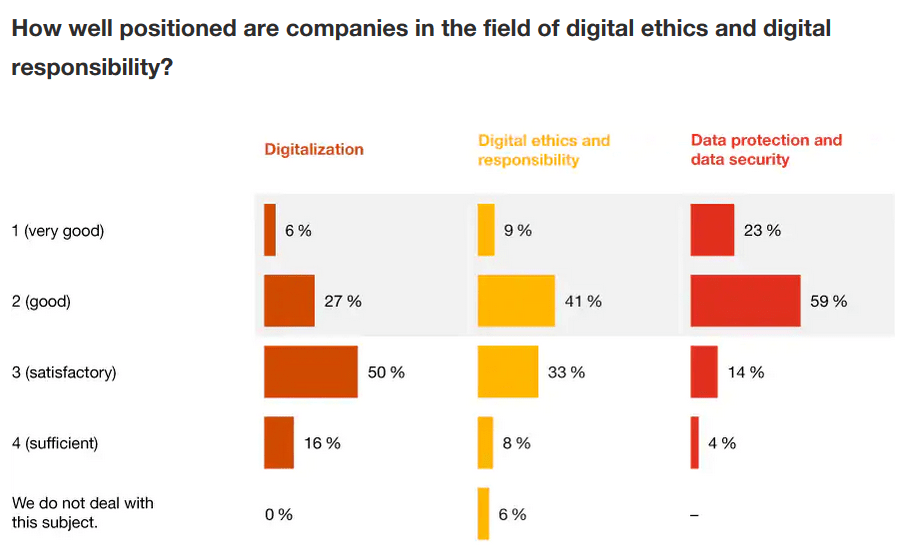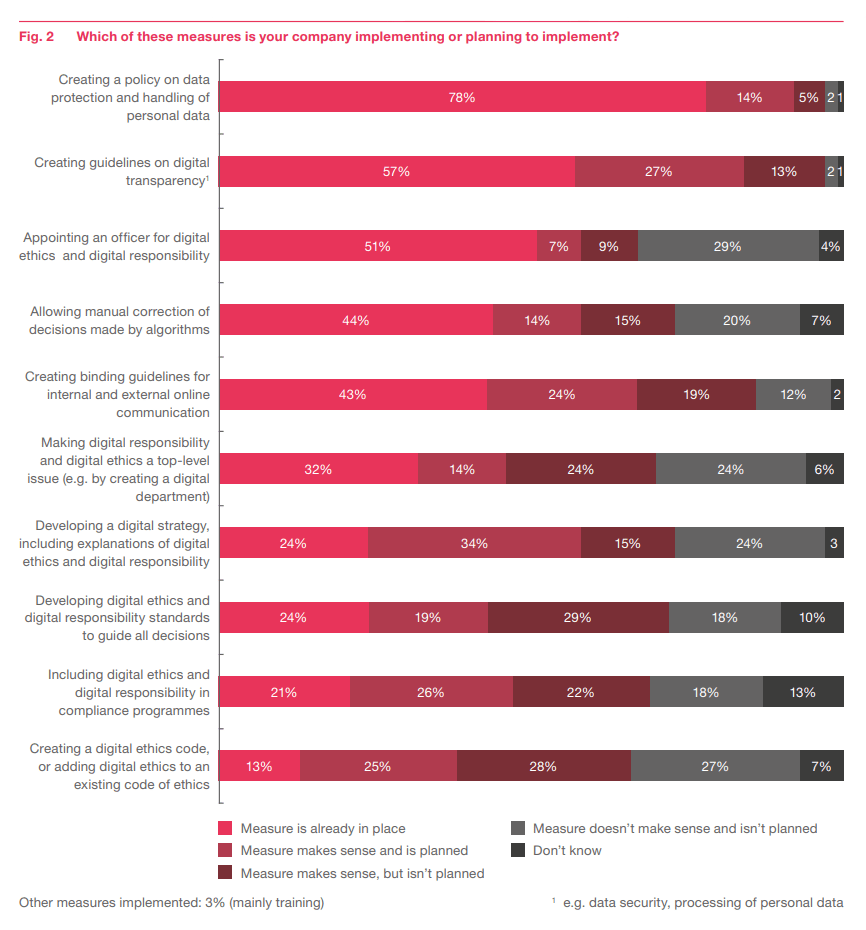Share this Post
The race for digital transformation is on. Emerging technologies are rapidly changing every aspect of how businesses operate and compete. Artificial intelligence (AI), process automation, big data and advanced analytics — these are the words, the concepts, the strategies that are being explored and debated in board rooms around the world as organisations seek new solutions to get ahead and gain advantage. The need to virtualise many areas of work in response to COVID-19 is accelerating these conversations and the digital transformations that will come out of them.
Digitalisation, indeed, is increasingly shaping our present and will determine our future. Yet, with it come ethical dilemmas that organisations have a pressing need — a responsibility — to face up to. How do companies manage data privacy rights while they immerse themselves in customer analytics so they can deliver better products and services? How do they balance efficiency and productivity gains enabled through automation against potential job losses? How do they define and assign responsibility in a world where AI-powered algorithms decide who gets credit, insurance, or a job?
These, and many more like them, are the questions of digital ethics.
Why We Need Digital Ethics
Organisations have always been pressed to balance economic and ethical imperatives — they must build their business profitably while minimising harm and maximising benefits for customers, employees, and society at large. However, the rapid pace of digitalisation and the associated changes to how business is done and customers are served creates big ethical challenges for the corporate world.
Building trust and gaining social acceptance is essential for new technology and business models to succeed — that is, to retain the economic/ethical balance that maximises profitability while minimising harm. As such, companies must design their digital transformation in a manner that strengthens society’s confidence in the digital economy and create transparency about the technology they use and the data they utilise.
As Daniela Hanauer, partner and expert for Risk Consulting at PwC Germany, puts it: “Digital ethics is not a marginal topic for companies. Firms that establish rules and standards for a responsible approach to digitalisation gain the acceptance of customers and the trust of society. This ensures their long-term business success.”
Why We Need Digital Ethics
Hanauer’s comment is in response to a recent PwC Germany study which seeks to provide an overview of the challenges and opportunities for responsible companies in the digital age — Digital Ethics: Orientation, Values and Attitudes for a Digital World. One of the key findings in the study is that only half of German companies consider themselves well-prepared or very well-prepared for digital ethics and responsibility right now.

PwC study “Digital Ethics”, 2019 —Source: pwc.de
The results also show that only one-third of German companies (33%) rate the status of their digital transformation as positive, suggesting that, overall, the majority of companies still have a long way to go in terms of digitalisation. By contrast, the companies give themselves a far better rating for their focus on data protection and data security — 82% are well-prepared for this. Undoubtedly, the EU’s General Data Protection Regulation (GDPR), which came into force in 2018, is a significant contributor to the companies’ preparedness, having built strong data protection and security policies and procedures to comply with the regulation. However, as PwC points out, these results show that “digitalisation is still understood in Germany in a very technical way, while companies are lagging behind in developing new business models and mastering ethical challenges.”
Nonetheless, even though digital ethics goes beyond complying with data privacy regulations, the implementation of GDPR remains a good entry point for companies to start addressing digital ethics issues. However, given the increasing powers being placed on digital technology — algorithmic decision-making has huge societal impact potential, for instance — it’s not enough for organisations to wait until legal frameworks are created to start applying digital ethics if they are to build the trust they need to succeed in the digital economy, especially as such frameworks are often created retrospectively.
Nonetheless, PwC’s survey reveals that almost three-quarters of companies (73%) still see the government as the main party responsible for developing digital ethics standards.

PwC study “Digital Ethics”, 2019 —Source: pwc.de
The Need for Self-Regulation
Rather than waiting for new regulations, companies have a lot to gain from being proactive about fulfilling their digital responsibilities and taking self-regulatory measures to meet them. While some may view such commitments as a competitive disadvantage, standing in the way of business, the truth is that ensuring the responsible handling of customer data and building new digital technologies in an ethically-oriented manner strengthens trust in the market.
“A framework for digital ethics should be considered an opportunity, especially in a competitive environment,” says PwC. “This is particularly true when working in close cooperation with other companies. Cooperation, industry associations and exchange on common standards can enable companies to efficiently create transparency for their customers and stakeholders.”
Many companies realise this already and have implemented or are planning to implement a huge range of measures to start applying digital ethics in their operations.

PwC study “Digital Ethics”, 2019 —Source: pwc.de
Challenges for Implementing Digital Ethics Strategies
Even with so many initiatives under way, half of German companies are still struggling to deal with digital ethics and implement technologies accordingly. PwC sought to uncover the factors impeding companies in coping with ethical challenges. Many were discovered. Above all, it was found that companies lack the right talents to develop and implement digital ethics strategies, cited by 56% of survey respondents. Another major hurdle to overcome is the lack of awareness of the importance of digital ethics — as 51% of survey participants confirm. Other obstacles include the way employees handle digital information (44%), unsuitable or outdated software solutions (35%), implementing guidelines on data security and protection (35%), and a number of other factors. Only 7% said that taking digital ethics measures reduces competitiveness, suggesting that, by and large, incorporating digital ethics can underpin both a socially acceptable corporate strategy and an organisation’s economic success.

PwC study “Digital Ethics”, 2019 —Source: pwc.de
Final Thoughts — Recommendations for Responsible Digitalisation
As the digital economy develops, digital ethics must play a key role in the technological transformation of organisations. More than just a buzzword or a sales pitch, digital ethics strives to ensure responsible action for the benefit of all – including businesses themselves. Companies that embrace digital ethics in their business models create trust in their products and services, and the more consistently digital ethics can be applied at the company, the more credible that company will become to its customers, business partners and stakeholders.
PwC recommends five courses of action for responsible digitalisation:
- Take responsibility — don’t wait for the regulators, build a code of digital ethics and take action now.
- Leverage existing structures — the values of digital ethics should be given a permanent place in existing management systems, such as risk management, compliance and HR measures.
- Digital ethics upskilling — only employees who are well-informed about digital ethics have the skills of sensitivity and problem-solving needed to address the many different digital ethics problems.
- Ethics in business processes — digital due diligence must run through the entire supply chain. A digital ethics heatmap and code of conduct can illustrate risks and enable a company to transparently communicate its own corporate requirements to suppliers and stakeholders.
- Value-oriented product development — employ ethics-by-design principles to prevent risks at the earliest possible stage in product development, rather than reacting to risks as they emerge.
To see the full results from PwC Germany’s study, access the full report here, and visit Institut für Digitale Ethik (The Institute for Digital Ethics) for more on corporate digital ethics and responsibility.
Share this Post



